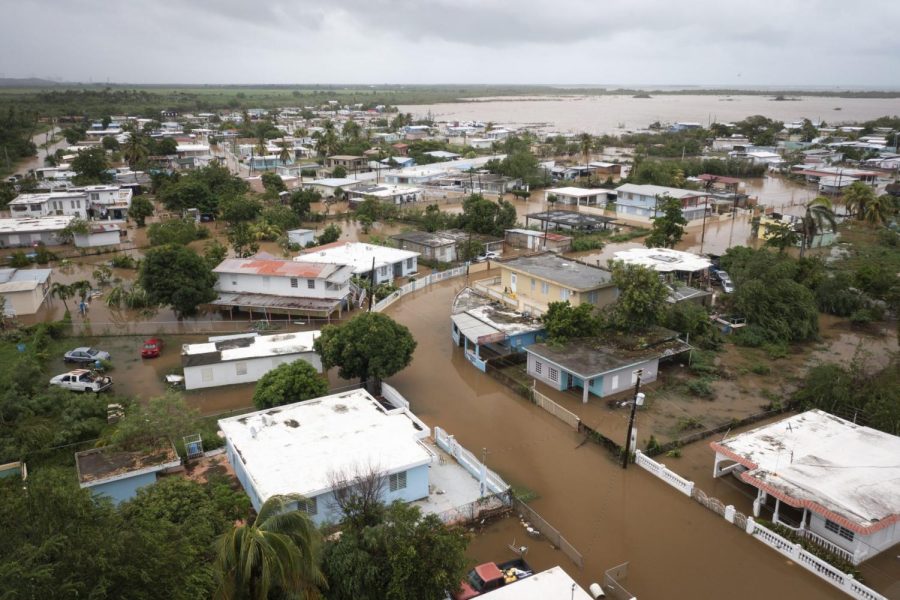Five years after Maria, Hurricane Fiona devastates Puerto Rico
Playa Salinas is flooded after the passing of Hurricane Fiona in Salinas, Puerto Rico, Monday, Sept. 19, 2022. Many Puerto Ricans are still without electricity and running water.
The island of Puerto Rico has been slammed with another crisis, five years after Hurricane María.
Hurricane Fiona touched down in Puerto Rico on Sept. 17 accompanied by torrential downpours, 85-mph winds and severe flooding.
“The truth is that it is difficult,” said Carlos Torres, 54, from San Juan, Puerto Rico. “There is no water nor electricity. My girlfriend has to buy [water] or borrow from someone else and bathe with rain water.”
The island experienced similar devastation after Hurricane María in September 2017. It is estimated that María hit land as a category four storm, but Puerto Rico’s wind sensors were damaged, leaving meteorologists with only a rough estimate of the land-based winds that ensued.
María wiped away homes, roadways, traffic signs, schools and businesses.
“The island was still not fully recovered from the effects of María in terms of infrastructure,” Nezih Altay said, DePaul professor and expert in humanitarian aid, logistics and disaster management and response. “This hurricane only exacerbates their pain.”
María was not the only destructive force that affected Puerto Rico within the past five years.
Since 2017, Puerto Rico has not only experienced natural disasters in the form of earthquakes, but also socio-economic disasters in the form of protests, political turmoil and the COVID-19 global pandemic. There are less than ideal conditions for the rebuilding of an island.
In the wake of Hurricane Fiona, President Biden announced that $60 million in aid will be provided to Puerto Rico.
“Humanitarian aid is emergency help, not development aid,” Altay said. “Humanitarian aid is [only] short term assistance. Puerto Rico needs to rebuild its infrastructure.”
After Hurricane María, Congress allocated $40 billion in disaster aid for Puerto Rico. This is in contrast with the estimated $90 billion worth that Puerto Rico actually lost in damages. By the end of May 2019, Puerto Rico had received less than $14 billion.
“When it comes to development aid, the problems are the same everywhere,” Altay said. “Corruption prevents the money [from going] to people and places in need. There is always politics involved.”
Isabel Olivo, a Puerto Rican junior at DePaul, says she sees how the humanitarian crises Puerto Rico continues to experience is intertwined with U.S politics.
“I think Donald Trump downplaying the effects of hurricane María placed further emphasis on the idea that, for the most part, Puerto Rico and the habitants of the island have to fend for themselves,” Olivo said.
While Biden has pledged more monetary support for the island than the Trump administration did after María, some say it still is not enough.
“In my opinion, what Puerto Rico needs, in addition to humanitarian aid… is development aid,” Altay said. “[They need] to strengthen, rebuild, and in some cases build from scratch the island’s infrastructure.”
Problems with water, electricity and access to other essentials do not just occur after a hurricane. For Puerto Rico, it has been an ongoing struggle as the island suffered from continuous blackouts even before hurricane Fiona hit.
“It’s incredible,” Torres said. “The electricity in my house just comes and goes.”
Money for rescue missions and emergency food and shelter provide short-term aid, but Puerto Rico needs help to establish a much stronger foundation to limit the emergency aid needed following future disasters.
“Mr. Biden’s promised $60 million will not cover anything other than humanitarian assistance,” Altay said.
Despite Puerto Rico’s greater need for infrastructure development, many feel that they are not even receiving the bare minimum when it comes to humanitarian aid.
“FEMA does help the poorest to fix houses,” Torres said. “[But] they don’t give me anything.”
Torres said he believes the government’s help has always been motivated mainly by promotional purposes, but even that help has waned over time as well.
“Two things… hinder development aid, politics and corruption,” Altay said.
There is also a disparity between how people conceptualize the United States as a country versus what the country actually constitutes.
“I feel like Puerto Rico most definitely gets overlooked as a part of the United States,” Olivo said. “The general public is unaware of Puerto Rico’s status as a Commonwealth, and most people don’t even know what that entails.”
People currently living in Puerto Rico, as well as those with ethnic ties to the island, are frustrated at the continued lack of attention and support Puerto Rico has historically received from the United States in the midst of disaster.
Torres believes that until Puerto Rico is receiving the proper attention, aid and infrastructure development, the island will continue to be swept away by recurring natural disasters.
“It is always the same,” Torres said.







